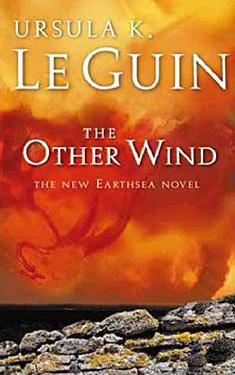Ursula K. Le
Guin
Completed 12/6/2018,
Reviewed 12/8/2018
4 stars
This is the
sixth and final novel of the Earthsea Cycle.
It has the same tone and form as the previous books. It’s short, contemplative, and
wonderful. The basic plot is saving the
world of Earthsea, this time from a breach in the wall between life and
death. All the characters from previous
books come back to join a new sorcerer in the battle. It moves a little more quickly than the
previous books, but still, the star is the prose, not the action. It is a fine conclusion to a wonderful set of
fantasy stories.
Alder is a
sorcerer who mends things. Not a trained
mage, he does not have a lot of the power that we’ve seen other mages attain in
the previous books. However, for some
reason, he is having dreams of the divide between life and death in the far west
where the wall that separates the two is being torn down by the dead. If the wall comes down, the dead invade Earthsea. He is sent to Sparrowhawk, the former
Archmage, who spent all his magic in book three in the land of the dead and now
lives an unassuming life as a farmer.
Sparrowhawk listens to Alder’s dreams and sends him to King Lebannen
where his wife Tenar and daughter Tenahu are helping the King. In addition, there is a rise in the attacks by
dragons throughout Earthsea. The four of
them, together with Dragonfly, the dragon-woman from the last book, and other
mages from the Council of Nine at Roke come together to figure out how to stop
the dragon attacks and to solve the crisis at the farthest shores of
Earthsea.
This book felt
like it had more action and movement than its predecessors, even though there
is a lot of discussion of what to do and how to do it. There was only one part that dragged a little
toward the middle of the book. The rest
was rather quickly paced for an Earthsea novel.
There detail isn’t so much in the journeys and the settings, it’s in the
dialogue, which is riveting at times.
The plot is a little more complex in this book as well, with several
things going on to keep the book moving.
The contemplative
nature of the book appears in that it still examines many of the questions that
were raised in the previous books: mage
versus sorcerer/witch, men versus women, and dragon versus human. All these are explored in this book, perhaps tying
up loose ends from the discussions that appeared in the previous volumes, but
coming together to solve the crisis at hand.
I give this
book four stars out of five. I feel like
I’ve already used up all my superlatives in my reviews for the other books,
repeating myself. It’s a wonderful
conclusion to a wonderful series. I’m
glad I finally took the time to reread the first three as well as discover the
last three. Next, I will be reading several
of her Hainish cycle books, the last and the first few and will see how these
compare to the greatness that is Earthsea.

No comments:
Post a Comment